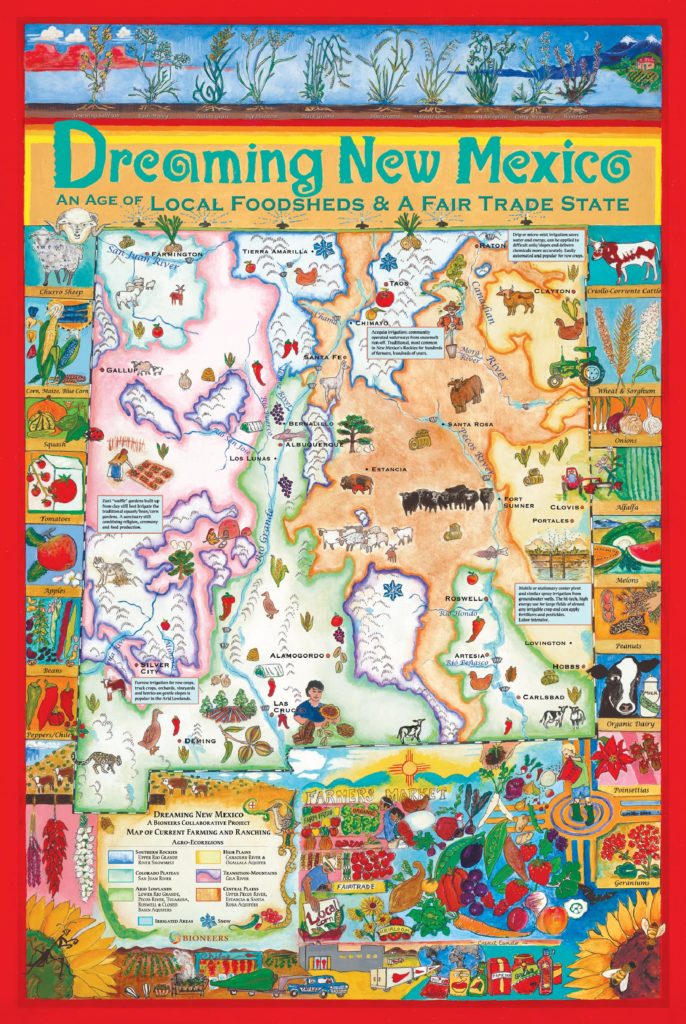Overview
The Dreaming New Mexico project seeks to reconcile nature and cultures at the state level. Taking care of nature means taking care of people, and taking care of people means taking care of nature. We seek systemic, collaborative approaches toward a common vision of restoration. Our focus is on both practical and visionary solutions.
A central element of the Dreaming New Mexico project is to help build a far more self-reliant local food system including a community-based, restoration economy that:
- Strengthens the vitality of the environmental and social fabric of the state and region
- Builds local prosperity, creates good jobs and locally owned businesses
- Places a central emphasis on providing food security while honoring vital cultural traditions and bio-cultural diversity

Why are local food systems important?
The Governor’s Climate Change Advisory group report issued in December 2006 sought to address carbon emissions from agriculture by setting a goal of 25% locally produced and consumed food by 2020. We will examine a multiplicity of strategies to help understand how to achieve that goal, help evolve the dream, map the moving parts and gaps as well as strengths, and help facilitate the networks that can realize such a food system.
New Mexico is third in the nation in “food insecurity” and fifth in hunger. Over 300,000 New Mexicans experience food insecurity and/or hunger. Only 6 states have a higher poverty rate than New Mexico. Hunger and poverty have a disproportionately negative impact on indigenous and rural communities in New Mexico.
What our research addresses:
Areas of focus for the food systems work include: local food economy, preservation of bio-cultural diversity, ecological agriculture, food access, preservation of farmland, and stewardship of water. The “uniting enemies” or issues around which to organize the work are: food insecurity, global warming, hunger, loss of farmland and farmers, loss of vital cultural traditions and foods, genetic engineering, and exploitative land and water policies – all issues that have enormous impact on local communities,
The food systems aspect of this initiative focuses on the questions:
- What would a sustainable, just, and more self-reliant and localized food system look like – one that fosters a sustainable economic base that provides for our grandchildren, honors the land, and supports vital bio-cultural traditions and the diversity of people and place?
- How do we create pathways to realize that vision?

As part of this project, we interviewed people across the state and leveraged the research of dozens of informed grassroots organizations. Throughout this website, we highlight their work.
Biocultural Crops and Traditional Farming – Biocultural Crops and Traditional Farming: A ten minute video that introduces the biocultural crops and traditional farming of New Mexico with excerpts from the interviews below: Larry Littlebird, Greg Cajete, Peter Pino, Edwin Torribio, Lois Ellen Frank, Miguel Santistevan, Arturo Sandoval, and Alvin Warren.
Lois Ellen Frank is a chef and author. Food in indigenous culture is associated with traditional practices like songs, prayers and planting methods. Lois talks about the benefits of traditional and local food and why it is important when buying non-local food to make sure that food is sustainable and supports the people in that community.
Miguel Santistevan, an ethnobotanist, farmer and seed saving activist from Taos who has developed a long-term collaboration with nature, talks about the adaptation of heritage crops, traditional dry-land farming systems, gathering wild plants, water strategies, and the significance of farming his grandmother’s land.
- Visit other organizations working on food and farming
- Watch video interviews
- 50 Top Future Crops for New Mexico by Gabriel Howearth (includes biocultural crops)
- Download Janet Reeve’s research on Hunger and Food Insecurity in New Mexico
- Download Ken Meter’s research on Agricultural Statistics and Profiles by Agro-ecoregion
- Download Michael Shuman’s research on Food Localization in New Mexico
